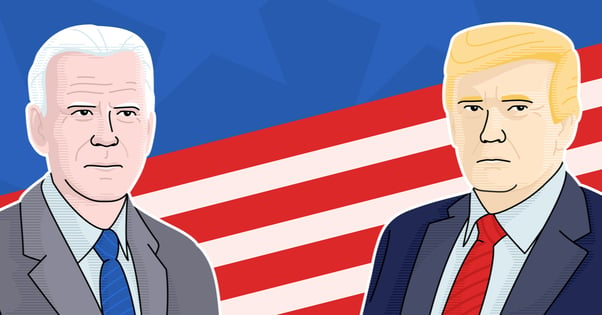With market volatility rising ahead of November US presidential and congressional elections, investors are parsing what polls and policy proposals mean for everything from energy stocks to shares of private-prison operators.
This anxiety is already showing up in the moves of assets that investors use to protect portfolios and wager on volatility like futures contracts tied to the CBOE Volatility Index, a gauge of expected stock swings. It is also driving moves in sectors that investors believe would benefit from control of the White House and Congress by one party or the other.
Wall Street typically uses some sectors or other assets that would be impacted by different policies to build broad election baskets associated with each political party. Traders then gauge the performance of those baskets over time to create probability forecasts of who they expect to win in November. So far data shows signal a roughly 60% chance of Democratic nominee Joe Biden winning and a 40% chance for President Trump.
Those were better chances than some forecasters gave Mr Trump, but Wall Street often struggles to predict both political outcomes and their impact on asset prices. Stock futures tumbled on election night in 2016 with investors concerned Mr Trump’s victory would hurt corporate earnings because of his unpredictable policies and advocacy for barriers to trade. Stocks quickly overcame those worries as traders cheered the prospect of tax cuts.
Other longer-term Trump trades, however, like bets on infrastructure spending and higher bond yields, have reversed in the past few years. Many investors also are weighing possible increases to corporate taxes. Mr Biden has proposed increasing the corporate tax rate to 28% from 21% and raising taxes on US companies’ foreign income, partially reversing the 2017 Tax Cuts and Jobs Act.
We estimate that Mr Biden’s tax policies could slice 9% off S&P 500 profits, though greater fiscal spending and the removal of tariffs could offset much of that decline. The bank’s basket of stocks that benefited most from tax cuts has recently trailed stocks that didn’t gain as much from the bill.
Still, some investors expect low interest rates and recovering economic growth to support stocks regardless of any policy shifts.
Some traders are hoping more clarity on trade policy with China would boost shares of companies such as semiconductor makers. The Trump administration’s trade feud with China sparked swings in stocks for much of 2018 and 2019 before the countries reached a phase-one trade deal. Mr Biden has indicated that he, too, would challenge Beijing in several areas but would try to work with US allies on trade issues.
Fullerton Markets Research Team
Your Committed Trading Partner















